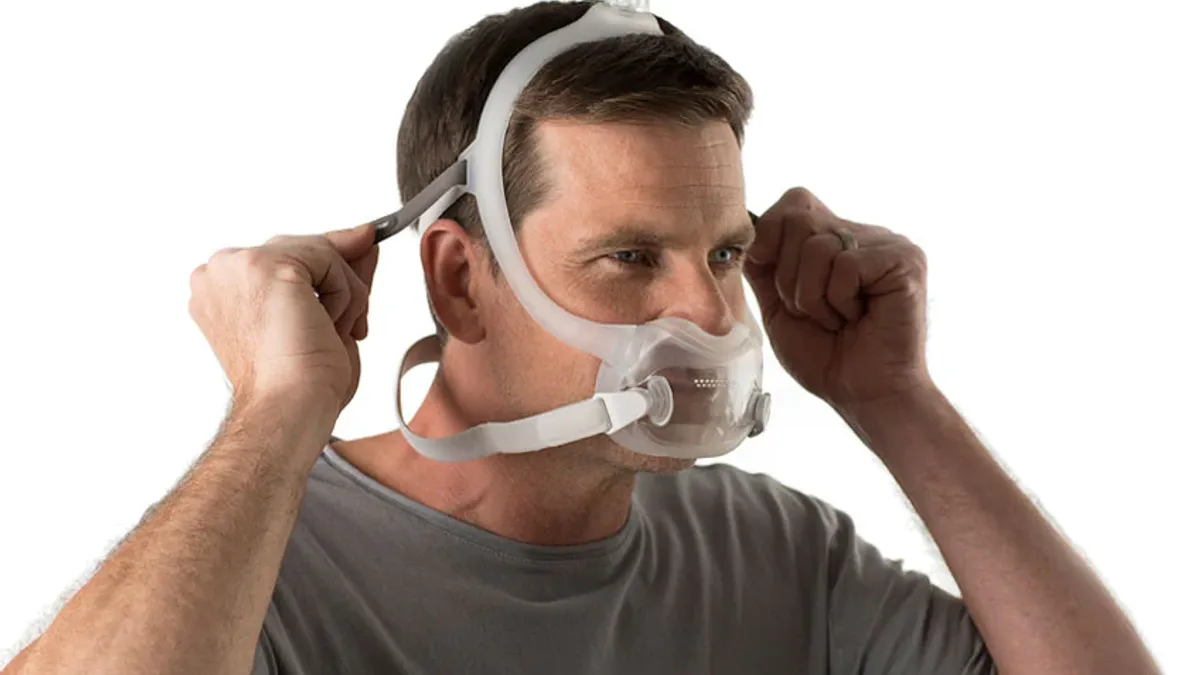Dive Brief:
- Philips is recalling more than 17 million masks used with its respiratory devices over concerns that magnets in the masks could affect some patients with implanted medical devices. The Food and Drug Administration says the magnets have been reported as the cause of 14 serious injuries.
- The recall centers on magnets that hold devices in place when patients wear masks for bilevel positive airway pressure (BiPAP) and continuous positive airway pressure (CPAP) therapy.
- While the issue is unrelated to the faults that led Philips to recall 5.5 million respiratory devices, the masks are used with some of the BiPAP and CPAP devices that are now being repaired and replaced.
Dive Insight:
The latest recall affects Philips’ DreamWisp, DreamWear, Amara View, Wisp and Wisp Youth masks. The masks feature magnets to connect components and hold devices in place. However, the magnets could affect medical devices, such as brain stents and cardioverter defibrillators, that are implanted in both the wearer of the mask and people near them.
The magnets may also affect patients with metallic objects in their bodies, such as shrapnel and splinters in their eyes, according to the FDA.
Both the FDA and Philips urged users of the masks who have implanted devices to switch to non-magnetic masks, and consult their physician for an alternative, and the company said it would work with resellers of the masks to provide alternatives for users who need them. Steve Klink, a Philips spokesperson, said in an email that the masks can still be used according to the updated instructions and labeling if patients or people in close proximity to them do not have implanted metallic devices or objects in their bodies.
As of Aug. 30, Philips had received 14 reports of serious injuries related to the recalled masks. The events included pacemaker failure, arrhythmia, seizures and irregular blood pressure. No deaths had been linked to recalled masks as of last week but the FDA thinks fatal outcomes are possible.
“This latest recall raises further safety concerns both for Philips devices already subject to a recall, as well as additional devices,” Jeff Shuren, M.D., J.D., director of the FDA’s Center for Devices and Radiological Health, said in the agency’s recall notice. “We strongly encourage providers and at-risk patients to review this important safety information and follow our recommended actions to reduce the potential for harm from these products.”
In its assessment of what could go wrong, the FDA said the magnets could lead to increased pressure on the brain or eye in patients with shunts, irregular heartbeat in patients with pacemakers, and failure to shock in patients with cardioverter defibrillators. Any of those events, and others related to the use of aneurysm clips and neurostimulators, could be fatal.
The use of the affected masks is now “contraindicated for patients and their household members, caregivers and bed partners that may be in close vicinity to patients using the masks” who have implanted devices such as pacemakers.
In its statement, Philips said the use of magnetic clips to attach headgear straps to masks is common in the sleep therapy device industry and called its revised labeling “a new and industry-leading practice.” The warning states magnets with a field strength of 400 mT are used in the masks. The user guide for ResMed’s F20 masks features a warning that states “the magnetic field strength is less than 400 mT” and advises keeping the headgear and frame at least 2 inches from any active medical implant.
Klink said in an email that the magnets used by Philips have a field strength of less than 400 mT.
The recall adds to Philips ongoing product safety issues for its sleep and respiratory care business. In June 2021, the company launched a recall for sleep apnea and ventilator machines due to the foam used to quiet the machines breaking down, creating the risk of users inhaling or ingesting the particles. The issue could potentially expose patients to toxic chemicals.
That recall has now grown to over 5.5 million devices, forced regulators including the FDA and the U.S. Department of Justice to step in, and led to several lawsuits. Philips has been off the market for about 15 months — and it could be longer depending on the DOJ consent decree negotiations — giving rival ResMed a unique opportunity to take market share.
On Thursday, Reuters reported that French prosecutors have opened a probe into the recall, based complaints filed for “aggravated deception, involuntary attacks on physical integrity, endangerment of life of others and administration of harmful substances."
In August, Philips also recalled BiPAP machines that may contain contaminated plastic. That recall was not connected to the foam recall, but some machines were included in both.
This article has been updated to clarify that the recall instructions allow most users to continue to wear the masks.











